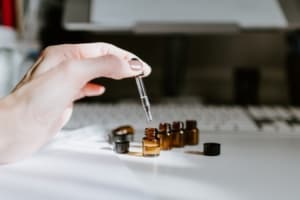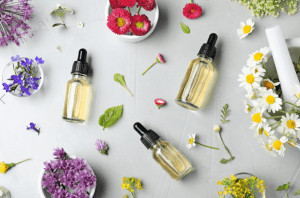Rosehip Oil Benefits & Uses For Skin, Hair & More!

- What Is Rosehip Oil? Rosehip Oil Explained
- Marula Oil Vs Rosehip Oil
- Rosehip Oil Benefits Explained
- Top Rosehip Oil Uses
- 1. Rosehip Oil For Acne
- 2. Rosehip Oil For Hair
- 3. Rosehip Oil For Skin
- 4. Rosehip Oil For Lips
- How To Use Rosehip Oil
- Rosehip Oil Face Serum DIY
- Does Rosehip Oil Clog Pores?
- Conclusion
With so many other oils that catch one’s attention, it’s sort of easy to walk right by rosehip seed oil without giving it a second glance. When you’ve got argan oil, jojoba, almond, apricot, and so many others – carriers and essential oils alike – rosehip seed oil can fall between the cracks. It’s somewhat underutilized, but as time goes by it seems to be getting more recognition from John Q. Public.
Ancient Persia is where rosehips are said to originate, and they arrived in Egypt, Greece, and also Rome in time. It has its uses in traditional Chinese and Indian medicine. Nowadays we add rosehip oil to a variety of cosmetics products including those for skin, nails, face, and hair.
What Is Rosehip Oil? Rosehip Oil Explained

Woman using rosehip oil.
Rose hips (also called rose heps, rosehips, and rose haw) are the fruit of the wild rose bushes, mainly Rosa moschata, Rosa rubiginosa, and Rosa canina. The fruit resemble small, oval-like berries, and they often come in the colors red, orange, purple, and black. The rose hips themselves will start to mature after the roses have flowered and the leaves have fallen off. When the fruit is ready it can be picked and processed into rosehip oil.
There are different ways to manufacture the oil. Nonetheless, cold-pressing rosehips is considered by some to be the more beneficial method of extracting the liquid. It allows the oil to retain the properties of the fruit itself. It does so in a more efficient way than other methods. This oil has been used as an herbal remedy in different traditions. However, it’s still considered to be alternative and supplementary medicine. As such, it’s not meant to take the place of any mainstream medication. At least, not with consulting with a physician first.
Marula Oil Vs Rosehip Oil
While rosehip oil is more recommended for irritation- and acne-prone skin, marula (Sclerocarya birrea) oil seems to have more moisturizing benefits for the skin, by and large, and it leaves the skin feeling more well-tended to. Technically, you could use either of them for the purposes of skin care. You can also mix and alternate between them to see how your body reacts. Because they contain different amounts of fatty acids and vitamins, they won’t affect each person or condition in the exact same way.
Marula is more fitting for dehydrated skin. Meanwhile, rosehip will probably be better for those who have oily/combo skin, and also skin whose pores have the tendency to become clogged or otherwise obstructed. Also, rosehip is considered by many users to be a greasier oil than marula, and if that is a consideration then you will need to take that into account.
The oil of the marula tree is probably not as well-known as rosehip oil quite yet, but it’s gaining popularity. If you want an oil that is not as sensitive to heat, light, and oxygen as rosehip, then marula is a safer bet. But if those things are not part of your beauty equation, it will largely be up to you and your specific circumstances. Don’t be afraid to experiment, since both of these precious plant extracts can produce great results when used properly.
There is no single oil that is categorically better and which does it all. This is often the case with plant extracts. It’s about trial and error, for the most part. Patch tests and travel-size cosmetics products are a good way to find out the effects on your skin. Whether marula or rosehip, it’s best to check before applying it topically to any part of your body.
Rosehip Oil Benefits Explained

Woman relaxing.
You can use many carrier oils as standalone products, and the oil of the wild rose bush is not left out of that group. Rosehip seed oil benefits different areas of the body and mind, and it is said to help everything from lowering cholesterol to repairing skin and reducing stress and anxiety. It’s an anti-inflammatory, antibacterial, antiviral, and antioxidant. It is also said to increase the strength of the body’s immune system.
While the oil is not recommended for internal use, the berry-like rosehips themselves can be eaten. In fact, they are eaten in different areas around the world, and are used in the production of various teas, jams, soups, and even wine. Food, health, beauty – rosehip oil is a highly valued commodity, and it’s nice to see that it is becoming more of a household name.
Top Rosehip Oil Uses
Rosehip oil is used for moisturizing skin and for combating the natural symptoms of aging. It’s also useful for lightening the skin’s hue and improving the general health and vitality of the skin cells. It also takes care of the hair and scalp. Whether as a preventive or reactive treatment, it is recognized as a useful supplement to a healthy diet and active lifestyle. It’s not a miracle cure for anything in particular. Nevertheless, it has the potential to work well with the body’s natural defenses and “combat units”, in order to keep the body in a positive, life-affirming balance. Let’s take a deep dive into the top rosehip oil uses.
1. Rosehip Oil For Acne

Woman admiring clear skin in mirror.
Using rosehip oil for staving off acne is becoming more well-known. Using rosehip oil for acne scars, however, is perhaps less known. Rose oil itself (not from the rosehips, but the rose itself) is excellent for treating scars, as are lavender and tea tree oil – but rosehip seed oil is getting more limelight as being a way to dramatically reduce scarring from acne. This is due to its high concentration of acids which affect scar tissue in the body and help it to reduce the scar’s presence and encourage healing.
As helpful as rosehip oil tries to be, this is not something you can automatically bank on. This is since scar tissue (and the process of fading) possesses a significant genetic component. It depends on the person’s skin type, the depth of the scarring, and the cause. In the case of acne, it also has to do with whether or not it is an acute or chronic condition. You also should consider the other ways you’re treating the condition before relying on a single oil.
2. Rosehip Oil For Hair

Woman with silky hair.
There is a long list of variables that affects your hair health. You could be using the wrong products, or using the right products in the wrong way. It could be your body and mind are going through changes, or perhaps hormones are acting up due to aging or pregnancy or diet. There are many reasons for the hair to become thin or loose, or afflicted with dryness or dandruff. The more common reason being pattern baldness of the male and female variety. Rosehip oil will help with some things, but it won’t turn back time or change one’s genetic makeup.
The scalp and hair can be aided with the help of this carrier oil. Whether you use it as a standalone, or in combination with other carrier or essential oils – your scalp, your roots, your follicles, and strands, they can all be strengthened through the use of rosehip oil. It’s a great oil for calming irritated areas of the scalp and bringing balance, which helps to prevent and treat conditions like dandruff.
3. Rosehip Oil For Skin

Woman using oil on skin.
As mentioned, the benefits for the skin are one of the more better-known attributes of rosehip seed oil. We can cause damage to our skin through a number of reasons, some more avoidable than others. Poor dieting, overexposure to the sun’s potentially-harmful rays, hormone changes or imbalances, stress and depression, and simple age and genetic predisposition. You can use this oil to help with anything from pigmentation to stretch marks and acne. Although it won’t necessarily affect people in the same exact way.
Same as with scarring and fading, a person’s skin type plays a role. There is also the important factor of any other skin care products a person may be using. Some products don’t blend well together. Additionally, using too many products could also bring about trouble. This is particularly relevant for those with sensitive skin. Our skin is the most exposed organ we have, covering our entire body. This must be taken into account when deciding what products to use, and in what amounts.
4. Rosehip Oil For Lips

Rosehip oil can nourish your lips.
The essential fatty acids which are part of rosehip oil’s composition are perfect for application as a lip moisturizer and/or lip balm. If your lips are dry or flaking, you can add rosehip oil to your lip products. You can also use it as a standalone product to help to manage the situation. If your lips are unable to retain moisture, rosehip oil may be able to help you out. It strengthens the protective barrier on the surface of your lips. If the symptoms continue, and you feel the situation is chronic, consider turning to a dermatologist for a more definitive diagnosis and possible solution.
Lips are a sensitive organ to begin with, full of blood and nerve endings. They react to touch, to cold or hot influences, and are generally highly susceptible to the elements and the state of the body. Keeping them happy, healthy, and plump is something rosehip oil can help you with.
How To Use Rosehip Oil
The best way to use rosehip oil is in combination with other oils and/or substances, but it’s also possible to use it alone, by applying it once or twice a day in measure. As a carrier oil, it is a bit on the thicker side, but some people actually prefer it that way. Put several drops of the oil on your palm and then massage it with a circular motion into your skin.
Examples of oils which rosehip seed oil goes well with are: lavender, jojoba, peppermint, argan, and sandalwood. Depending on the intended use (massage therapy, aromatherapy, skin conditioning, hair care, etc.) and the thickness of the end-product, you could use it for many applications related to health and beauty. Don’t force it, however, and be sure to perform a patch test if there is any risk of allergy or sensitivity.
Rosehip Oil Face Serum DIY Recipe & Guide

Oils for DIY serum.
First off, using a face serum as part of your regular beauty routine is not a bare necessity or a must of any kind. This is true whether you’re a man or a woman. That said, many individuals who are prone to irritation and dryness are using face serums. So are those who are more susceptible to symptoms brought on by aging or the elements.
Having a clean, smooth, and more youthful complexion has its advantages, for sure. But so does possessing a face with some character. Certain things will occur more frequently as you age, but if you want to keep your face looking fresh and clean for longer, a rosehip seed oil serum could be a help.
You could buy a commercial rosehip serum, or you could create one for yourself by going the DIY route. Rosehip oil can work wonders on your face. There are several ways of using it, other than applying it daily on its own. You use serums to protect and to heal, to create a barrier while boosting collagen production and increase healthy skin cell regeneration.
As a rule of thumb: less is more. This is because usually, you use serums primarily as part of a basis for makeup or heavier moisturizer, not a standalone product. Experiment and see which oils you react the best to. Try to blend a few drops of rosehip seed oil with jojoba oil and ylang-ylang essential oil. Aloe vera is another widely-used substance, thanks to its strong resemblance to the body’s natural oil, the sebum. Rosehip also blends well with argan, with frankincense, and with avocado oil.
Day and nighttime applications seem to be the most popular. Take care not to over-moisturize. Yes, there is such a thing. Keep things within measure as best you can, and pay attention to what your face is showing you, because you can get too much of something positive, after all.
Simple Rosehip Oil Face Serum DIY Recipe
- Jojoba oil
- Rosehip seed oil
- Lavender essential oil
Use a 2:1 ratio of jojoba to rosehip and then add 5-15 drops of lavender oil (or another essential oil of your choosing), This is a rather simple recipe which will give you an idea of how rosehip oil may work for you. For testing and experimenting purposes, use 2 teaspoons of jojoba, 1 teaspoon of rosehip, and 5 or so drops of lavender. Then, mix it all and place inside a dropper. Apply it gently, work it in, and see if it adds any value to your overall moisture levels.
Does Rosehip Oil Clog Pores?

Woman checking skin for clogged pores.
I mentioned getting too much of a good thing in the above paragraph. Clogged pores are one possible result of overusing cosmetics products. Even substances which have the ability to easily penetrate the tissue and get into the space between the skin cells, may turn on the individual who misuses them.
The trait of keeping the pores unclogged is known as being non-comedogenic. Oils which are non-comedogenic are less likely to clog pores, but this does not mean they are 100% fail-proof. This is why even the most natural and delicate oils should be used with caution. Also, rosehip seed oil is somewhat thicker than some other carrier oils, so take that into account when you calculate your amounts and methods of use.
Conclusion
You can add rosehip to your life in different forms: as a snack, a tea, a jam or jelly, and also as rosehip seed oil. Whether you are using the oil as an alternative/complementary medicine or as a healthy dietary supplement, it has its place.
Storage of rosehip oil should be in a dark glass vial or bottle, ideally in a dark and cool place such as a refrigerator or medicine cabinet. Like other oils, you should place it out of direct sunlight. Seal it as tight as can be to avoid unnecessary exposure to oxygen. Rosehip oil can become rancid quite easily, and you don’t want to apply that type of oil to your skin, or blend it with other products.
A note on manufacturing: while cold-pressed oils are often seen as best, there are other methods of manufacturing this oil, such as chemical extraction. Cold pressing has its advantages and detriments. So, if cold-pressed oil doesn’t affect you in a positive way, consider trying rosehip oil which was processed differently. It might yield more positive results in your specific case.
Rosehip seed oil is gaining more traction and attention. However, this doesn’t mean that any product which incorporates it into its formula is immediately better. Take a look at the list of ingredients, and see how high up it is (or isn’t) on the list. Notice if it’s organic and cold-pressed. Additionally, keep in mind that there are different species of roses used in the manufacturing process. The idea is to find the best rosehip oil that will have the best effect on you!


